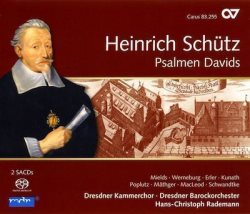| 
|
Heinrich SCHÜTZ (1585-1672)
Psalms of David, Op.2 SWV22-47 (1619)
Dorothee Mields, Marie Luise Werneburg (sopranos); David Erler, Stefan Kunath (counter-tenors); Georg Poplutz, Tobias Mäthgar (tenor): Stephan MacLeod, Felix Schwandtke (bass)
Dresden Chamber Choir
Dresden Baroque Orchestra/Hans-Christoph Rademann
rec. October 2012, Stadkirche, ‘Zum Heiligen Namen Gottes’, Radeberg
CARUS SACD 83.255 [65:48 + 75:35]
Schütz’s Psalms of David was published in 1619 and the twenty-six, often polychoral settings announced his early mastery of sacred writing. It now falls to Hans-Christoph Rademann to add them to his ongoing series of recordings of the complete edition of Schütz’s works, and let us say from the outset that they are sung and performed, and come to that shaped, every bit as convincingly as the earlier releases in this exhaustive series.
Rademann prefers solo singers balanced against the fuller choral forces. These soloists, the so-called ‘favoriti’ are given the responsibility of bringing illustrative power to their sung lines, to sing ‘as well and as sweetly’ as possible. These solo singers are vested with the conveyance of the texts’ imagery in all its power and immediacy, whilst the ripieno choruses have a different function, which is, in the composer’s words, ‘for a strong sound and for splendour’. It’s true that they are used as reinforcements of sound at points but they do sit at a distinct musical remove from the soloists. It should be noted that other recordings have preferred a one voice to a part approach.
Amplitude is provided not simply by the levels of choral contribution but also by the accompanying orchestral forces, eloquently performed by the Dresden Baroque Orchestra. The balance between brass and continuo forces and choir differ given the forces employed – in some cases the accompaniment is richer and denser than in others. Aus der Tiefe ruf ich, herr, zu dir is, for example, quite discreetly and lightly accompanied. Whether the settings are magisterial or jubilant – an example of the latter is the magnificent setting of Jauchzet dem Herren, alle Welt – Rademann’s reading has another quality firmly in its favour and that concerns the excellence of the solo singing. Dorothee Mields needs little introduction in this kind of repertoire but her soprano colleague Marie Luise Werneburg proves a more-than-adequate partner, being secure throughout her range and highly effective. It’s invidious to pick out soloists. They are part of the work’s sonic amplitude and grandeur.
A final thing to note: Danket dem Herren, den er ist freundlich SWV45 (not to be confused with SWV32) is heard in this performance in a version for brass choir and timpani in a reconstruction by the trumpeter Edward H. Tarr.
Jonathan Woolf
 |
 |
|



 All Nimbus reviews
All Nimbus reviews








